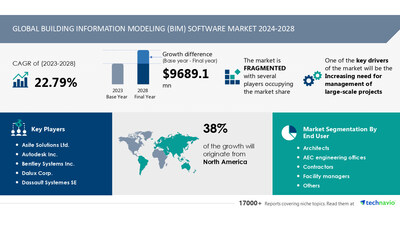NEW YORK, Nov. 8, 2024 /PRNewswire/ — Report with the AI impact on market trends – The global building information modeling (BIM) software market size is estimated to grow by USD 9.69 billion from 2024-2028, according to Technavio. The market is estimated to grow at a CAGR of 22.79% during the forecast period. Increasing need for management of large-scale projects is driving market growth, with a trend towards growth of 5d building information modeling. However, high implementation and operating costs poses a challenge.Key market players include Asite Solutions Ltd., Autodesk Inc., Bentley Systems Inc., Dalux Corp., Dassault Systemes SE, Glodon Co. Ltd., Hexagon AB, KUBUS B.V., MRI Software LLC, Nemetschek SE, Oracle Corp., Pinnacle Infotech, Plannerly, Planon Shared Services BV, Procore Technologies Inc., Revizto SA, Schneider Electric SE, thinkproject Holding GmbH, Trimble Inc., and Virtual Construction and Technology BIM One Inc..
Key insights into market evolution with AI-powered analysis. Explore trends, segmentation, and growth drivers- View Free Sample PDF
|
Building Information Modeling (Bim) Software Market Scope |
|
|
Report Coverage |
Details |
|
Base year |
2023 |
|
Historic period |
2018 – 2022 |
|
Forecast period |
2024-2028 |
|
Growth momentum & CAGR |
Accelerate at a CAGR of 22.79% |
|
Market growth 2024-2028 |
USD 9689.1 million |
|
Market structure |
Fragmented |
|
YoY growth 2022-2023 (%) |
19.3 |
|
Regional analysis |
North America, Europe, APAC, South America, and Middle East and Africa |
|
Performing market contribution |
North America at 38% |
|
Key countries |
US, China, UK, Japan, and France |
|
Key companies profiled |
Asite Solutions Ltd., Autodesk Inc., Bentley Systems Inc., Dalux Corp., Dassault Systemes SE, Glodon Co. Ltd., Hexagon AB, KUBUS B.V., MRI Software LLC, Nemetschek SE, Oracle Corp., Pinnacle Infotech, Plannerly, Planon Shared Services BV, Procore Technologies Inc., Revizto SA, Schneider Electric SE, thinkproject Holding GmbH, Trimble Inc., and Virtual Construction and Technology BIM One Inc. |
Market Driver
The construction industry has seen a shift towards more advanced building information modeling (BIM) solutions to enhance project efficiency and accuracy. While 3D BIM provides a three-dimensional representation of building designs, it lacks integration for time and cost factors. This gap led to the emergence of 5D BIM, an evolution of 4D BIM, which considers five dimensions including time, cost, and labor productivity. With 5D BIM, investors can easily access crucial information such as deviations from the pre-determined project schedule and budget, an in-house database with complete cost and labor productivity details, efficient preparation of cost schedules, and real-time cost estimation for quick comparisons with the target cost. The development of 5D BIM solutions is expected to significantly contribute to the growth of the global BIM software market during the forecast period.
The BIM software market is thriving as construction companies embrace digital technology for more efficient operations. BIM technology offers digital representations of buildings, enabling cost estimation tools for budgeting and cost control during the project life cycle. Contractors benefit from construction schedules and sequencing plans, while architects and engineers use BIM software for planning & modeling. Government mandates drive market growth, with many mandating BIM usage in the construction sector. Initial expenditure on BIM software can be high, but long-term benefits include virtual reality (VR) and augmented reality (AR) for project visualization, IoT sensors for facility management, and maintenance. BIM solutions come in on-premise and cloud-based deployment modes, catering to various building types – commercial and residential. The market includes components for construction & design, asset management, and project visualization, streamlining decision-making processes. Product launches continue, with innovations in cost control, contractor collaboration, and real-time data access. Despite the benefits, low productivity due to initial expenditure and learning curve hinder widespread adoption. However, the trend towards digital construction is undeniable, with BIM technology set to revolutionize the construction sector.
Request Sample of our comprehensive report now to stay ahead in the AI-driven market evolution!
Market Challenges
- The global BIM (Building Information Modeling) software market growth is hindered by the high cost of these solutions. Small architectural and engineering firms in the construction industry find it challenging to adopt BIM software due to its expensive price tag. These software packages come with numerous modules for various applications, but they offer minimal value for SMEs with smaller project sizes. The high cost of training and support, as well as ongoing maintenance fees, further impedes market expansion. Additionally, the ongoing geopolitical conflict between Russia and Ukraine has disrupted the supply chain for construction materials, leading to increased implementation and operating costs. These rising costs may deter potential adopters of BIM software, thereby hindering market growth during the forecast period.
- The Building Information Modeling (BIM) market is growing rapidly, driven by the need for efficient construction operations and digital transformation in the industry. However, challenges persist, such as the integration of AR and VR technologies like Bentley Systems Incorporated’s iTwin platform for project visualization. Deployment modes, including on-premise and cloud-based solutions, impact the commercial viability of BIM software for various building types, from commercial to residential. BIM software solutions facilitate planning & modeling, construction & design, asset management, and facility management. Challenges include initial expenditure, low productivity, and process changes. Training and education are essential for successful BIM implementation. Government mandates and IoT sensors play a role in driving BIM adoption. Bentley’s engineering applications, such as structural engineering and steel fabrication management, address specific challenges. Product launch and decision-making processes are streamlined through BIM technology, enhancing project life cycle efficiency. BIM software and hardware require careful data management, especially during the construction phase. Contractors and architects/engineers benefit from BIM’s ability to improve collaboration and coordination. Project visualization and maintenance are essential components of BIM solutions. The construction sector continues to evolve, with digital construction and IoT sensors shaping the future of the industry. Bentley’s infrastructure cloud offers a comprehensive solution for managing BIM data and facilitating efficient construction operations.
Discover how AI is revolutionizing market trends- Get your access now!
Segment Overview
This building information modeling (bim) software market report extensively covers market segmentation by
- End-user
- 1.1 Architects
- 1.2 AEC engineering offices
- 1.3 Contractors
- 1.4 Facility managers
- 1.5 Others
- Deployment
- 2.1 On-premises
- 2.2 Cloud-based
- Geography
- 3.1 North America
- 3.2 Europe
- 3.3 APAC
- 3.4 South America
- 3.5 Middle East and Africa
1.1 Architects- Building information modeling (BIM) software has become a game-changer in the architectural industry, enabling architects to design and construct buildings more efficiently and effectively. This software allows architects to create detailed 3D models that integrate all aspects of a building’s design, construction, and operation. By facilitating collaboration among professionals such as engineers and contractors, BIM software streamlines the construction process and reduces potential misunderstandings or errors. Architects can easily modify designs and iterate, eliminating the need for traditional 2D drawings. BIM software also promotes better communication among team members by allowing the integration of data from various disciplines into a single model. This reduces conflicts and clashes between design elements and saves time and costs by identifying and resolving potential issues before construction. Architects also use BIM software to optimize energy performance and sustainability in building designs by simulating energy usage and conducting energy analysis. Furthermore, BIM models contain detailed information about each building component, including specifications, maintenance schedules, and supplier data. This information is accessible to facility managers and building owners, enabling them to maintain and operate buildings more effectively throughout their lifespan. Architects’ crucial role in the BIM software market is expected to fuel its growth during the forecast period.
Download a Sample of our comprehensive report today to discover how AI-driven innovations are reshaping competitive dynamics
Research Analysis
Building Information Modeling (BIM) technology revolutionizes the construction industry by enabling digital representations of buildings and infrastructure projects. BIM software is a key solution for cost estimation, budgeting, cost control, construction schedules, and sequencing plans. It benefits contractors, construction operations, and government mandates by streamlining processes, enhancing collaboration, and improving accuracy. The initial expenditure for implementing BIM software can be high, but the long-term advantages include efficient decision-making processes, on-premise and cloud-based options, and integration with IoT sensors for facility management and maintenance. The BIM market spans various sectors, including commercial and residential, and encompasses planning & modeling, construction & design, and project visualization. Digital technology continues to evolve, making BIM software an essential tool for the construction sector.
Market Research Overview
The Building Information Modeling (BIM) market is experiencing significant growth due to the increasing adoption of digital technology in the construction sector. BIM technology allows for the creation of digital representations of buildings and infrastructure, facilitating efficient construction operations through cost estimation tools, budgeting, cost control, construction schedules, and sequencing plans. BIM software is essential for contractors, construction operations, and government mandates, enabling project visualization and decision-making processes. BIM market solutions include planning & modeling, construction & design, asset management, and facility management. Deployment modes include on-premise and cloud-based, catering to commercial and residential building types. BIM technology also integrates with virtual reality (VR) and augmented reality (AR) for improved project visualization. BIM market growth is driven by the need for efficient construction operations, digital construction, and low productivity. Initial expenditure on BIM technology, including hardware and software, is a significant consideration. Training and education, process changes, data management, IoT sensors, and product launches are key factors influencing the BIM market. Bentley Systems Incorporated, with its infrastructure cloud and iTwin platform, offers a range of engineering applications, including structural engineering and steel fabrication management.
Table of Contents:
1 Executive Summary
2 Market Landscape
3 Market Sizing
4 Historic Market Size
5 Five Forces Analysis
6 Market Segmentation
- End-user
- Architects
- AEC Engineering Offices
- Contractors
- Facility Managers
- Others
- Deployment
- On-premises
- Cloud-based
- Geography
- North America
- Europe
- APAC
- South America
- Middle East And Africa
7 Customer Landscape
8 Geographic Landscape
9 Drivers, Challenges, and Trends
10 Company Landscape
11 Company Analysis
12 Appendix
About Technavio
Technavio is a leading global technology research and advisory company. Their research and analysis focuses on emerging market trends and provides actionable insights to help businesses identify market opportunities and develop effective strategies to optimize their market positions.
With over 500 specialized analysts, Technavio’s report library consists of more than 17,000 reports and counting, covering 800 technologies, spanning across 50 countries. Their client base consists of enterprises of all sizes, including more than 100 Fortune 500 companies. This growing client base relies on Technavio’s comprehensive coverage, extensive research, and actionable market insights to identify opportunities in existing and potential markets and assess their competitive positions within changing market scenarios.
Contacts
Technavio Research
Jesse Maida
Media & Marketing Executive
US: +1 844 364 1100
UK: +44 203 893 3200
Email: media@technavio.com
Website: www.technavio.com/
![]() View original content to download multimedia:https://www.prnewswire.com/news-releases/building-information-modeling-software-market-to-grow-by-usd-9-69-billion-from-2024-2028–as-demand-for-large-scale-project-management-rises-with-ai-driving-market-transformation—technavio-302298676.html
View original content to download multimedia:https://www.prnewswire.com/news-releases/building-information-modeling-software-market-to-grow-by-usd-9-69-billion-from-2024-2028–as-demand-for-large-scale-project-management-rises-with-ai-driving-market-transformation—technavio-302298676.html
SOURCE Technavio

Featured Image: DepositPhotos @ Sdecoret





